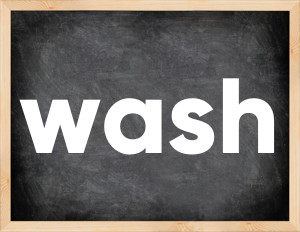 The English verb 'wash' is pronounced as [wɑːʃ].
The English verb 'wash' is pronounced as [wɑːʃ].
Related to:
regular verbs.
3 forms of verb wash: Infinitive (wash), Past Simple - (washed), Past Participle - (washed).
Here are the past tense forms of the verb wash
👉 Forms of verb wash in future and past simple and past participle.
❓ What is the past tense of wash.
Wash: Past, Present, and Participle Forms
| Base Form | Past Simple | Past Participle |
|---|---|---|
| wash [wɑːʃ] |
washed [wɒʃt] |
washed [wɒʃt] |
What are the 2nd and 3rd forms of the verb wash?
🎓 What are the past simple, future simple, present perfect, past perfect, and future perfect forms of the base form (infinitive) 'wash'?
Learn the three forms of the English verb 'wash'
- the first form (V1) is 'wash' used in present simple and future simple tenses.
- the second form (V2) is 'washed' used in past simple tense.
- the third form (V3) is 'washed' used in present perfect and past perfect tenses.
What are the past tense and past participle of wash?
The past tense and past participle of wash are: wash in past simple is washed, and past participle is washed.
What is the past tense of wash?
The past tense of the verb "wash" is "washed", and the past participle is "washed".
Verb Tenses
Past simple — wash in past simple washed
(V2).
Future simple — wash in future simple is wash (will + V1).
Present Perfect — wash in present perfect tense is
washed
(have/has + V3).
Past Perfect — wash in past perfect tense is
washed
(had + V3).
wash regular or irregular verb?
👉 Is 'wash' a regular or irregular verb? The verb 'wash' is regular verb.
Examples of Verb wash in Sentences
- Will this paints wash off? (Future Simple)
- It's my turn to wash the dishes (Present Simple)
- She offered to wash all clothes (Past Simple)
- He never washes hands after using the toilet, that's gross (Present Simple)
- Are you washing dishes or talking on the phone? (Present Continuous)
- See that dry cleaning? They wash money there (Present Simple)
- I have washed the car, so now get me coffee (Present Perfect)
- I hate to wash hair every day, but what else I can do? (Present Simple)
- He has been washing this pot for half an hour (Present Perfect Continuous)
- Will we wash the floor tomorrow (Future Simple)